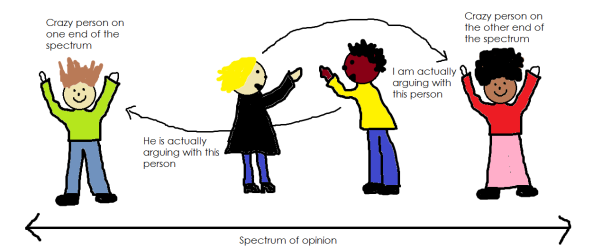At a training workshop I attended this week the facilitator argued that while being able to make a logical argument is a vital skill in life, we can all appreciate its limits by considering, when was the last time we won a logical argument with our partners…
This got me thinking about the alternatives – when logical argument is not enough to overcome disagreement, what options do we have? I have come up with a few below – but I want to preface them by saying they are not offered from a place of expertise but rather from my ongoing experiences of learning the hard way! So apologies if they seem really obvious to you but anyway, here are my options…
Option 1: Give up
The biggest lesson, that I keep failing to learn, is that in many cases it is just not worth trying to argue with someone. If they do not have a similar way of seeing the world – and particularly if they do not share your views about evidence and logic – you are just going to waste your time (as illustrated beautifully – albeit with a bit of strong language – here). In this case you have two further options: if they are being mean, proceed immediately to this outstanding advice on dealing with mean people in subversive ways. However, if they are basically harmless, have a cup of tea, and turn the conversation to something less charged.
Option 2: Figure out if you are close in opinion but facing different directions
I have noticed that many of the heated discussions I get into on a professional basis fall into this category. This is where you are both actually arguing with someone (in your head) who has a far more extreme position than the person in front of you – a little like this…
A good example of people standing close but facing in different directions was a seminar I did with LSHTM’s Justin Parkhurst (you can view the whole thing here if you are bored!). In essence, I think we were making very similar points in our talks about evidence and policy making (he did express his ideas more eloquently but I made up for it by having better pictures). The main difference was in some of the language we used and the aspects we chose to emphasise. I imagine that Justin, as a social scientist surrounded by pesky scientists who tend to see the world as measurable and absolute, finds himself having to emphasise the social and cultural influences on the creation of ‘knowledge’. I on the other hand work to promote more use of evidence in policy making and therefore, while I ponder the nature of reality and truth as much as the next person, I also spend a lot of time trying to persuade people that, for the purposes of decision-making, it is helpful to consider certain things (that HIV causes AIDS, that homeopathic remedies do not cure malaria, that Chihuahuas are cute…) as scientifically proven. If you can recognise that you are in this category of disagreement (and luckily in the seminar I mention, we very quickly did), it becomes much more easy to figure out the small differences of opinion you have got and discuss them rationally.
Option 3: Learn from them
My boss, whenever faced with a disagreement, likes to consider what the situation looks like from the other person’s perspective. He reckons that even if what another person is saying seems ludicrous to you, to them, it will seem like a logical and internally consistent position and it is worth trying to figure out what that might look like. This learning might at least help you to deal with the person – but it may also help you to realise that there is some merit in the position they are taking. If you can be open-minded enough to properly listen to a conflicting point of view, you can really learn a lot. I have experienced this by reading a whole load of BIG books in development – Dead Aid, The Bottom Billion, The End of Poverty, The Trouble with Africa, White Man’s Burden, Why Nations Fail etc etc. These books present a range of ways of looking at the world – some of which I instinctively disagreed with from the outset – but I really think I have learnt a lot from each book. Of course, the great advantage of trying to learn from other perspectives is that, just occasionally, you might realise that your perspective was (whisper it) wrong! It reminds me of a story I have heard about Gandhi – when asked why he could contradict this week what he had said last week and he is said to have answered – “It’s because this week I know better!”.


